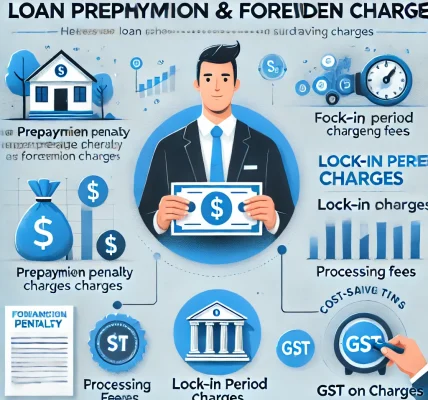How Loan Policies Vary Across Different Lenders and Banks: A Comprehensive Guide for Investors
In today’s dynamic financial landscape, securing a loan is an essential part of personal and business investments. However, navigating the world of loans can be a complex process. Loan policies differ significantly across lenders and banks, which can significantly affect the terms and conditions of your loan. Whether you’re an individual seeking personal finance or a business owner looking for capital, understanding how these loan policies vary across different lenders and banks is crucial.
1. Understanding Loan Policies: What Are They?
Loan policies define the rules, terms, and conditions set by financial institutions to determine whether to approve or deny a loan application. These policies outline the interest rates, repayment schedules, collateral requirements, credit score thresholds, and other factors that affect the borrower. Banks, non-bank financial companies (NBFCs), and private lenders all have their unique sets of criteria, and understanding these distinctions can make a huge difference in securing a favorable loan.
2. The Role of Credit Scores in Loan Approvals
Credit scores are one of the most critical factors influencing loan policies. Different lenders place varying emphasis on the borrower’s credit score, which is a numerical representation of an individual’s or business’s creditworthiness.
- Banks: Traditional banks typically have stricter credit score requirements for loans. A high credit score (700 and above) is often required to secure competitive interest rates and favorable loan terms.
- NBFCs: Non-Banking Financial Companies tend to be more flexible in their credit score policies. They may approve loans with slightly lower credit scores, but they often offset this flexibility with higher interest rates and fees.
- Private Lenders: Online lenders or private companies may also have more relaxed credit score requirements, but they might focus more on the borrower’s income and cash flow instead. As a result, they could offer a quicker approval process with higher interest rates to mitigate risk.
3. Loan Types and Their Variations Across Lenders
Lenders and banks offer different loan types, each with its own policies. These include personal loans, business loans, home loans, and auto loans. Here’s how they differ:
- Personal Loans: These loans are typically unsecured, meaning you don’t need to provide collateral. Banks usually have stringent eligibility criteria, while private lenders might be more lenient. NBFCs may offer personal loans at competitive rates, but with additional processing fees.
- Business Loans: Banks and NBFCs have specific loan policies for businesses, with particular focus on the business’s financial health, credit history, and operational stability. Banks may require a business to be operational for at least two years, while NBFCs or private lenders might approve loans with shorter operational histories.
- Home Loans: Home loans tend to have longer repayment periods (often 15-30 years). While traditional banks may offer lower interest rates on home loans, private lenders may offer faster processing but at a higher cost.
- Auto Loans: The criteria for securing an auto loan can differ across lenders. Banks usually require a stable credit score and income verification, while private lenders might prioritize the vehicle’s value and offer loans with shorter repayment terms.
4. Interest Rates and Fees: A Key Differentiator
Interest rates are one of the most significant factors in loan policy decisions. While all lenders will consider a borrower’s credit score, income, and financial stability, the rates and fees can vary widely:
- Banks: Generally, banks offer lower interest rates for loans compared to private lenders or NBFCs. However, their loan approval process tends to be more rigid, and they may charge various processing fees and penalties.
- NBFCs: Non-Banking Financial Companies tend to offer higher interest rates, but they often provide more flexibility and quicker processing times. Their loan policies may include relaxed income and credit score requirements compared to traditional banks.
- Private Lenders: Private online lenders often provide fast approval and a more convenient online application process. However, their loan policies typically include higher interest rates to compensate for the increased risk of lending without face-to-face interaction.
5. Repayment Terms and Flexibility
Another area where loan policies can vary is in the repayment structure. Lenders offer different repayment schedules based on the type of loan, borrower’s profile, and the lender’s policies.
- Banks: Banks tend to offer longer repayment terms for mortgages and personal loans. The terms are fixed, and penalties for early repayment may apply.
- NBFCs and Private Lenders: These lenders often provide more flexible repayment options. For example, private lenders might allow the borrower to adjust the payment schedule based on fluctuating income, making it an attractive option for borrowers with variable cash flow.
6. Approval Time and Documentation Requirements
Loan approval time can vary significantly based on the lender’s policies. Banks often have a detailed and time-consuming approval process that involves substantial paperwork and verification. On the other hand, private lenders and NBFCs generally offer a quicker process, with less documentation required.
- Banks: Banks usually require extensive documentation, including proof of identity, income, tax returns, and sometimes a guarantor. The approval process can take from several days to a few weeks, depending on the complexity of the loan.
- NBFCs: While NBFCs still require documentation, they often streamline the process, allowing for faster approval. They might also offer more lenient terms on documentation, especially for smaller loans.
- Private Lenders: Online lenders tend to have the fastest approval times, with minimal paperwork. Many private lenders approve loans within 24 to 48 hours, but again, these loans tend to come with higher rates and fees.
7. Why Loan Policies Matter for Investors
For investors looking to fund their businesses, projects, or personal endeavors, choosing the right lender with favorable loan policies is critical. The terms of your loan, such as the interest rates, repayment schedule, and approval time, can directly affect your ability to manage cash flow and the overall profitability of your investment.
Investors should carefully consider the different loan policies available to them, weighing the pros and cons of each lender’s offerings. Understanding how these policies affect your financial future will help you make informed decisions that align with your goals.
Conclusion: Navigating Loan Policies
Whether you’re a seasoned investor or a first-time borrower, understanding how loan policies vary across different lenders and banks is vital to making smart financial decisions. It’s essential to evaluate the loan’s interest rate, repayment terms, approval times, and documentation requirements before choosing the right option for your needs. By doing so, you can ensure you get the best deal for your investment while keeping costs manageable and financial risks under control.




